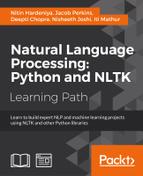I again want to take you guys back to school, where we learned grammar. Now tell me why you learnt grammar Do you really need to learn grammar? The answer is definitely yes! When we grow, we learn our native languages. Now, when we typically learn languages, we learn a small set of vocabulary. We learn to combine small chunks of phrases and then small sentences. By learning each example sentence, we learn the structure of the language. Your mom might have corrected you many times when you uttered an incorrect sentence. We apply a similar process when we try to understand the sentence, but the process is so common that we never actually pay attention to it or think about it in detail. Maybe the next time you correct someone's grammar, you will understand.
When it comes to writing a parser, we try to replicate the same process here. If we come up with a set of rules that can be used as a template to write the sentences in a proper order. We also need the words that can fit into these categories. We already talked about this process. Remember POS tagging, where we knew the category of the given word?
Now, if you've understood this, you have learned the rules of the game and what moves are valid and can be taken for a specific step. We essentially follow a very natural phenomenon of the human brain and try to emulate it. One of the simplest grammar concepts to start with is CFG, where we just need a set of rules and a set of terminal tokens.
Let's write our first grammar with very limited vocabulary and very generic rules:
# toy CFG >>>from nltk import CFG >>>toy_grammar = nltk.CFG.fromstring( """ S -> NP VP # S indicate the entire sentence VP -> V NP # VP is verb phrase the V -> "eats" | "drinks" # V is verb NP -> Det N # NP is noun phrase (chunk that has noun in it) Det -> "a" | "an" | "the" # Det is determiner used in the sentences N -> "president" |"Obama" |"apple"| "coke" # N some example nouns """) >>>toy_grammar.productions()
Now, this grammar concept can generate a finite amount of sentences. Think of a situation where you just know how to combine a noun with a verb and the only verbs and nouns you knew were the ones we used in the preceding code. Some of the example sentences we can form from these are:
- President eats apple
- Obama drinks coke
Now, understand what's happening here. Our mind has created a grammar concept to parse based on the preceding rules and substitutes whatever vocabulary we have. If we are able to parse correctly, we understand the meaning.
So, effectively, the grammar we learnt at school constituted the useful rules of English. We still use those and also keep enhancing them and these are the same rules we use to understand all English sentences. However, today's rules do not apply to William Shakespeare's body of work.
On the other hand, the same grammar can construct meaningless sentences such as:
- Apple eats coke
- President drinks Obama
When it comes to a syntactic parser, there is a chance that a syntactically formed sentence could be meaningless. To get to the semantics, we need a deeper understanding of semantics structure of the sentence. I encourage you to look for a semantic parser in case you are interested in these aspects of language.
